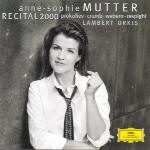Deutsche Grammophon’s booklet cover shows Anne-Sophie Mutter in a white dress shirt and loose-fitting tie. After listening to Recital 2000, there’s no doubt that she wears the pants in her musical orb. She’s got a flawless technique that enables her to make the violin do her every bidding. She can conjure up an amazing variety of colors and nuances with no apparent effort. These attributes are all assets when it comes to George Crumb’s fragile sound world, or Webern’s compressed forms and rapid textural shifts. Similarly, these virtuosic components brilliantly coalesce in Respighi’s yummy, rhapsodic sonata. The central Andante emerges like an extended aria, while the outer movements are detailed with shape and specificity. For sheer energy and charged bravura Mutter even surpasses Kyung-Wha Chung’s assured, heroic DG recording; yet Chung benefits from Krystian Zimerman’s razor-sharp accompaniments, as opposed to Lambert Orkis’ excellent, less individual support for Mutter.
In the Prokofiev D major Sonata, though, Mutter’s talents get in the music’s way. She over-interprets Prokofiev’s wishes to the point of distraction. Accents are underlined to cartoon-like effect, and her naturally expressive vibrato often spills over into the realm of the cloying (remember Mantovani, or the 101 Strings?). Mutter italicizes dynamic contrasts in a manner that belabors the obvious. Violin players, of course, would give their eyeteeth to match Mutter’s skills, but they might choose Itzhak Perlman as their role model in this composition. His 1970 RCA recording (with Vladimir Ashkenazy in tow) shows that expressive economy and gorgeous violinism are not mutually exclusive virtues. In sum, a release well worth hearing, but have a back-up Prokofiev D major at the ready.
































